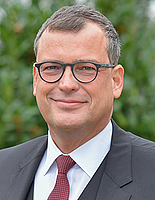Member in Focus
Gerald Haug elected Fellow of the Royal Society

Prof. (ETHZ)* Dr. Gerald H. Haug
Image: Markus Scholz | Leopoldina
The President of the German National Academy of Sciences Leopoldina, Gerald Haug, has been elected as a Foreign Member of the Royal Society, the British academy of science. The Royal Society is one of the world's oldest and most prestigious learned societies and is the national academy of science of the United Kingdom. Admission to the Royal Society stands among the highest distinctions scientists can receive.
The climatologist, geologist and paleoceanographer researches the development of the earth's climate over the last millennia to millions of years. He does this by examining sediment cores drilled from the bottom of oceans and lakes. The chemical composition of the different sediment layers provides clues to the climate conditions at the time each layer was deposited. Gerald Haug thus reconstructs historical climate conditions and their changes. The results of paleoclimate research play a central role in researching the causes of climate changes and thresholds, especially regarding the dynamics of the climate system.
Gerald Haug has published numerous scientific papers and has been awarded several prizes for his work, including the Gottfried Wilhelm Leibniz Prize of the German Research Foundation (DFG). He was recently awarded an honorary doctorate by the Faculty of Mathematics, Engineering and Natural Sciences at Heidelberg University. In addition to his presidency at the German National Academy of Sciences Leopoldina, which he took up in 2020, Gerald Haug has been Director of the Department of Climate Geochemistry at the Max Planck Institute for Chemistry in Mainz and Professor at the Department of Climate Geochemistry at the Swiss Federal Institute of Technology Zurich (ETHZ) since 2015. After research stays in Kiel/Germany, Vancouver/Canada, Massachusetts/USA, Los Angeles/USA and Zurich/Switzerland, he was head of the section "Climate Dynamics and Sediments" at the German Research Centre for Geosciences (GFZ) in Potsdam from 2003 to 2007 and at the same time Professor at the University of Potsdam. In 2007 he transferred to ETHZ.
Gerald Haug has now been granted an exceptional honour with his induction into the Royal Society. The UK's national science academy was founded in 1660 and lists some of the most eminent scientists among its members, including Isaac Newton, Charles Darwin and Albert Einstein. In 2023, the Royal Society admitted 59 Fellows and 19 Foreign Members to its body of 1700 members - alongside Gerald Haug, fellow German National Academy of Sciences Leopoldina members Huajian Gao, Jane Parker, Rajeev Kumar Varshney, Jeff L. Dangl, Edvard Moser and May-Britt Moser.
